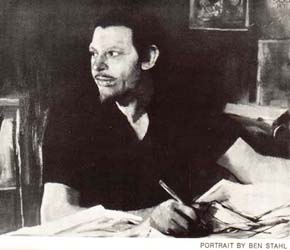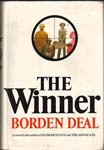Major Works
- There Were Also Strangers (1985)
- Adventure (novel) 1978
- Legend of the Bluegrass (novel) 1977
- Bluegrass (novel) 1976
- The Other Room (novel) 1974
- The Winner (novel) 1973
- A Neo-Socratic Dialogue on the Reluctant Empire (novel) 1971
- Interstate (novel) 1970
- Dragon’s Wine (novel) 1969
- The Advocate (novel) 1968
- The Least One (novel) 1967
- A Long Way to Go (novel) 1965
- The Tobacco Men (novel) 1965
- The Loser (novel) 1964
- The Spangled Road (novel) 1962
- Devil’s Whispers (novel) 1961
- The Insolent Breed (novel) 1959
- Secret of Sylvia (novel) 1958
- Dunbar’s Cove (novel) 1957
- Search for Surrender (novel) 1957
- Killer in the House (novel) 1957
- Walk through the Valley (novel) 1956
- “The New South Saga” (series)
- “Olden Times” (series)
Biography of Borden Deal
by Ashley Jefferson (SHS)
Borden Deal was born Loyse Youth Deal on October 12, 1922 in Ponotoc, Mississippi. He was born to Borden Lee and Jimmie Anne (Smith) Deal (Evory 160). Deal was the youngest of three children (Lloyd 125). He was raised in Union County near New Albany (Kibler 69). Although he was raised in New Albany, he did the majority of his growing up around the communities of Ponotoc and Ingomar (Lloyd 125). Borden grew up during the Depression. Borden’s father, a farmer, lost his land when the price of cotton dropped during the Depression. Deal’s family procured two mules from Roosevelt’s rehabilitation program. His family traveled to a communal, government-sponsored farming project in Enterprise, Mississippi (Kibler 69).
Deal became interested in writing at a young age. He knew he wanted to write since the age of six (Lloyd 125). As he got older, he was also interested in things like fishing, golf, guitar playing, and being in the presence of beautiful and intelligent women (Evory 160).
When Deal became of age, he attended Macedonia Consolidated High School near Myrtle, Mississippi (Kibler 125). In 1938, Deal’s father died in a truck accident; and at that point, Deal left home to further his education (Evory 69).
After high school, Deal joined the Civilian Conservation Corps and fought fires in the Pacific Northwest. He moved from one CCC camp to the next by hitchhiking and riding freight trains (Lloyd 125). Then he began working on a showboat. He als hauled sawdust for a lumbar mill, and then followed the wheat harvest with other migrant workers by freight train (Kibler 69). Deal also had jobs that pertained to writing. He was an auditor between 1941-42 for the U.S. Department of Labor in Washington, D.C. He worked as a correspondent for Association Films in New York. According to Evory, Deal worked between 1950 and 1955 as a skip tracer, telephone solicitor, copywriter, and a free- lance writer (Evory 160). Borden Deal was in the U.S. Navy between the years of 1942-45 (Evory 160). He joined the Navy as an aviator cadet. He was also a radar, aircraft recognition, and an anti-aircraft fire control instructor in Ft. Lauderdale, Florida, where he lived for many years (Lloyd 125).
In 1948, Deal’s first piece of work was published. Seven years after his first publication, Borden Deal decided to devote himself to writing. In 1955, Deal became a full-time professional writer of fiction (Lloyd 125), publishing under the names Loyse Deal, Lee Borden, and Leigh Borden (Kibler 69).
In 1946, Deal enrolled in the University of Alabama of Tuscaloosa and received his B.A. in three years (Lloyd 125). He received his B.A. in 1949 and went on to do his graduate study at Mexico City College in 1950 (Evory 160). Borden’s major in college was English and his minor was creative writing (Lloyd 125). He studied under the famed creative writing teacher Hudson Strode at Alabama (Florence). He also became a student of the Jungian psychology (Kibler 70).
Deal first married Lillian Slobtotosky, who was of European parentage, in Mexico. He and Lillian divorced but had one child. Borden in 1952 married a second time. His new wife Babs was also a writer. From that union were born three children: a daughter Ashley in 1954, a son Brett in 1955 or 56, and another daughter Shane, who was born in late 1959 or early 1960. Caldwell states that Borden and Babs were married for twenty-two years before they divorced in 1975.
Borden Deal was a prolific novelist as well as a short story writer (Lloyd 125). He made work and vocation the main focus of his novels of the New South. The Tobacco Men, The Insolent Breed, The Spangled Road, Walk through the Valley, Dunbar’s Cove, and Dragon’s Wine are all vocational novels which he wrote (Lloyd 126).
In all, there are twenty-one novels, about one hundred short stories, and other works written by Borden Deal (Kibler 69). His novels are spontaneous eruptions of the collective unconscious. The major theme in Deal’s work is “man’s mystical attachment to the earth itself” (Kibler 70). Deal considers himself “a child of my time and place” (Lloyd 125) and his writings show this strong sense of place and time (Kibler 71). According to Kibler, Deal is a sensitive and intuitive writer ( 72). A characteristic of Deal’s books is his tendency to “superimpose his plots and characters upon the primeval patterns of behavior” (Kibler 70). Deal “has taken…the enormous scope and diversity of the (whole) region as a mural like canvas for his books” (Lloyd 125).
Deal is a product of his region and past. He knows about the people, country, and era from which he writes (Dollarhide 9). His family’s perseverance during the Depression accounts for the pervasive themes of land quest and personal ambition. He believes that the” individual mind is composed of more than the knowledge and experience internalized during the life span of the person.” Deal feels that “the artist has the peculiar task of transmitting archetypal images and symbols to his fellowman” (Kibler 71-72). Many of Deal’s novels are set in the South. “The South, in both its good and its bad, is the cradle of my heart,” Deal wrote (Lloyd 125). Deal feels that the value of his work lies “in the progressive panorama of the ‘real’ South…If someone two hundred years from now wants to know about the real South, of people working and living, they’ll have to go to my books.” When Deal refers to the “real South,” he is referring to the “ordinary, practical lives of contemporary Southerners (Kibler 70). Deal has secured a reputation as a storyteller who re-creates man’s most ancient conflicts within the context of the contemporary South (Kibler 72). Kibler says that the characters Deal writes about are honest and uncomplicated characters who are “motivated by some elemental drives of human nature” (70).
Deal is best known for Dunbar’s Cove and The Insolent Breed (May 122). He wrote Dunbar’s Cove in 1957, and it was made into the movie called Wild River. This novel was a prime early example of “the documentary–an emotional statement, in terms of characters and drama and conflict, about an experienced event, a balancing and a molding of fact and fiction into a truth greater than either alone” (Lloyd 126).
The Insolent Breed, written in 1959, was the basis of the Broadway musical A Joyful Noise (Kibler 70). The Insolent Breed tells how a musical family make a name for themselves outside the little town of Macedonia. The Platinum Man is the sequel to The Insolent Breed (Kibler 126). Dragon’s Wine, another novel written by Deal, was written in 1960, and it shows a deeper and darker side of Deal’s character. This novel is a dark and bloody story that treats the outbreak of greed and demonic ambition in the human personality (Kibler 70).
Walk through the Valley was Deal’s first published novel (Lloyd 126). According to Kibler, the novel Walk through the Valley proves Deal to be a novelist who writes with “the authority of experience of farming and the rhythms of the seasons.” A Long Way to Go, written in 1965, is a treatment of the ritual of initiation (Kibler 70).
He wrote The Tobacco Men in 1965. The Tobacco Men is based on notes by Theodore Dreiser and Hollywood writer Hy Kaft. This novel is a fictional account of the Kentucky tobacco wars of the early 1900’s. It shows Deal’s love of detail and his ability to weave fact and fiction. This novel is also noted primarily for its documentary value (Kibler 71). “Old Times” and “The New South Saga” are also among Deal’s finest achievements.. “The New South Saga” is a trilogy about Southern politics (Lloyd 126).
Deal’s novels have been Reader’s Digest Book Club selections. Also, his short stories have appeared in literary periodicals like McCall’s, Collier’s, Good Housekeeping, and Southwest Review (Lloyd 127). Other sources state that his short stories have appeared in Saturday Review (May 122), and in volumes such as Best Americans, and Best Detective. One short story that he is particularly well- known for is Antaeus. It has appeared in many high school anthologies. Deal is also known for “Exodus,” which won first prize in a national contest (Kibler 69). This short story also won Tomorrow magazine’s college writers contest in 1948 (Lloyd 127) and was reprinted in Best American Short Stories of 1949 (Kibler 69).
Deal wrote other novels such as Secret of Sylvia in 1958 and Devil’s Whispers in 1961 (Evory 160). Lloyd says that Deal’s The Spangled Road is considered a “circus novel” (Lloyd 126).
Deal’s work has been adapted for the screen, the stage, the radio, and the television (Kibler 69, 70). In addition, his work has been translated into twenty different languages (Lloyd 127). According to one source, Deal was also the author of a series of lucrative soft-porn novels published with the pronoun titles He, She, Them, under the pseudonym Anonymous.
Deal was involved in many organizations such as the Authors Guild, the American P.E.N., the Tennessee Squire Association, and the Sarasota Writers’ Roundtable (Evory 160). He was also a recipient of the Guggenheim and MacDowell Colony fellowships in 1957, the same year that his first novel became a best seller.
He was recognized by the American Library Association and the Alabama Library Association because he recorded, predicted, and revealed twentieth century life in the American South to be (Lloyd 127). He received the American Library Association and Justice Awards for his novel Walk through the Valley and the Alabama Liberty Association Literary Award in 1963. He also received the John H. McGinnis Memorial Award, was named “Worst Liar of the Year” by the Sarasota Writers’ Roundtable in 1971 (Evory 160), and was designated “Sesquicentennial Scholar” during the University of Alabama’s 150th Anniversary in 1981 (Local People-Authors).
Borden Deal lived in Florida and became friends with David T. Warner, a writer who had been raised in Tuscaloosa, Alabama, but who had moved to Florida. In 2001 Warner wrote a book entitled Vanishing Florida: A Personal Guide to Sights Rarely Seen. A memoir by Warner of his friend Borden Deal is said to be the best writing in this book. Unfortunately, Deal as a writer is now largely forgotten. Perhaps Warner’s book may help revive interest in the work of Borden Deal.
On January 22, 1985, Borden Deal died of a heart attack in Sarasota, Florida. (May 122).
Timeline
- 1922-October 12, Borden Deal was born in Ponotoc, Mississippi.
- 1938- Deal’s father died, and he decided to leave home.
- 1941- Deal worked for the U.S. Department of Labor as an auditor in Washington, D.C.
- 1942-45- Deal was in the U.S. Navy.
- 1948- “Exodus,” Deal’s first publication, was published.
- 1949- “Exodus” won first prize in a contest and was printed in Best American Short Stories.
- Deal received his B.A. from the University of Alabama.
- 1950- Deal became a graduate student at Mexico College.
- 1950-55- Deal worked as a correspondent, skip tracer, telephone solicitor, and a copywriter.
- 1952- Deal married his second wife, Babs Hodges.
- 1955- Deal was a freelance writer.
- He became a full-time professional writer of fiction.
- 1956- Deal wrote Walk through the Valley.
- 1957- Deal wrote Dunbar’s Cove, Killer in House, Search for Surrender, and he received recognition for Walk through the Valley.
- 1958- Deal wrote Secret of Sylvia.
- 1959- Deal wrote The Insolent Breed.
- 1960- Deal wrote Dragon’s Wine.
- 1961- Borden wrote Devil’s Whispers.
- 1962- Borden wrote The Spangled Road.
- 1963- Deal was awarded the literary award by the Alabama Library Association.
- 1964- Borden wrote The Loser.
- 1965- Deal wrote A Long Way to Go and The Tobacco Men.
- 1967- Deal was awarded a Guggenheim Fellowship and he wrote The Least One.
- 1968- Borden wrote The Advocate.
- 1970- Deal wrote Interstate.
- 1971- Borden wrote A Neo-Socratix Dialogue on the reluctant Empire.
- 1973- Deal wrote The Winner.
- 1974- Deal wrote The Other Room.
- 1975- Borden and Babs divorced.
- 1976- Borden wrote Bluegrass.
- 1977- Deal wrote Legend of the Bluegrass.
- 1978- Borden wrote Adventure.
- 1981- Deal was designated “Sesquicentennial Scholar.”
- 1985- January 22, Borden Deal died of a heart attack in Sarasota, Florida.
- 1985– There Were Also Strangers published posthumously.
Reviews
A Review of The Advocate
by Ashley Jefferson (SHS)
The novel The Advocate by Borden Deal discusses the complex life of a small town lawyer. This novel takes place in Tupelo, Mississippi, which at that time was considered a small town. This novel displays some of Deal’s own actions and ways of living. For example, Deal portrays John Bookman, the main character, as a man who loves women, and it is a known fact that Deal loved to be around beautiful and intelligent women himself.
John Bookman is faced with many problems. The problems begin when Walter Page crosses him when he begins making an effort to get his professional life intact. Since he is new in town, John is very vulnerable, leaving room for Mr. Page to take advantage of and use him. One crisis that starts early begins when John comes into some money and decides that he wants to purchase a house. This purchase is the beginning of problems with his wife Nancy. The house is old, rugged, and needs quite a bit of work. Nancy feels as though it is a bad investment. She also wonders what the rest of the town thinks, but John could care less what the town thinks.
John gets deeper into his law practice, and he and his new partner, Joe Luckey, decide to purchase some land. They need the financial aid of Walter Page. Since Walter made John look bad before, this idea doesn’t exactly set well with Nancy, though the three of them pursue the endeavor further.
The most threatening conflict in this novel, in my opinion, was the fact that John had a child by someone else. Nancy was unable to have children. Margaret, the mother of the child, was unmarried. Mag’s father was not pleased when John came to see her. John and Mag decided that David, their son, would be better off with John. Nancy received David as her own. That really surprised John, but it also filled his heart with joy knowing that his wife would accept his bastard child. John decided that law was no longer for him, so he ran for governor. In the process, he gave up his partnership with Joe. John was no longer convinced that making money was what the occupation was all about. I personally feel that he did all of this because he began to realize that responsibility and family were more important.
The book was great, in my opinion. The novel showed how people can be change from zero to hero, but some popularity is not always what you want. John changed from having to struggle , to a house on the hills, and he soon realized that that house was not what he anticipated. I think that John decided that humility was within, and for that reason, he let the entire state of Mississippi know that he had no shame. I recommend this book to everyone.
Related Websites
- Encyclopedia of Alabama: Borden Deal
- Alabama’s Literary Landscape: Borden Deal
- Murder with Southern Hospitality provides interesting information about Deal.
Bibliography
- Caldwell, Sarah Tillery. Email. “Writers and Musicians Project.” January 27, 2001.
- Evory, Ann. “Borden Deal.” Contemporary Authors. Volume 2. Detroit, Michigan: Gale Research, 1962. 159-160.
- May, Hal. “Borden Deal.” Contemporary Authors. Volume 114. Detroit, Michigan: Gale Research,1985. 122.
- Dollarhide, Louis. “November 10,1957…a new novel by a Mississippian.” Of Arts and Artists: Selected Reviews of the Arts in Mississippi, 1955-1975. Jackson: University Press of Mississippi, 1981. 8-9.
- Kibler, James. “Borden Deal.” Dictionary of Literary Biography: American Novelists Since World War II. Volume 6. Detroit, Michigan: Gale Research Company, 1980. 69-70
- “Local People-Authors: Borden Deal.” (Online) Available http://www.websun.com/sjcol/author.ht, April 12, 2000.
- Florence, Rebecca. “Alabamians to Receive UA Society for the Fine Arts Awards.” (Online) Available http://www.ua.edu/sfa.ht, February 2, 1998.
- Lloyd, James B. “Borden Deal.” Lives of Mississippi Authors, 1817-1967. Jackson, Mississippi. University Press of Mississippi. 1981. 125-127.’



